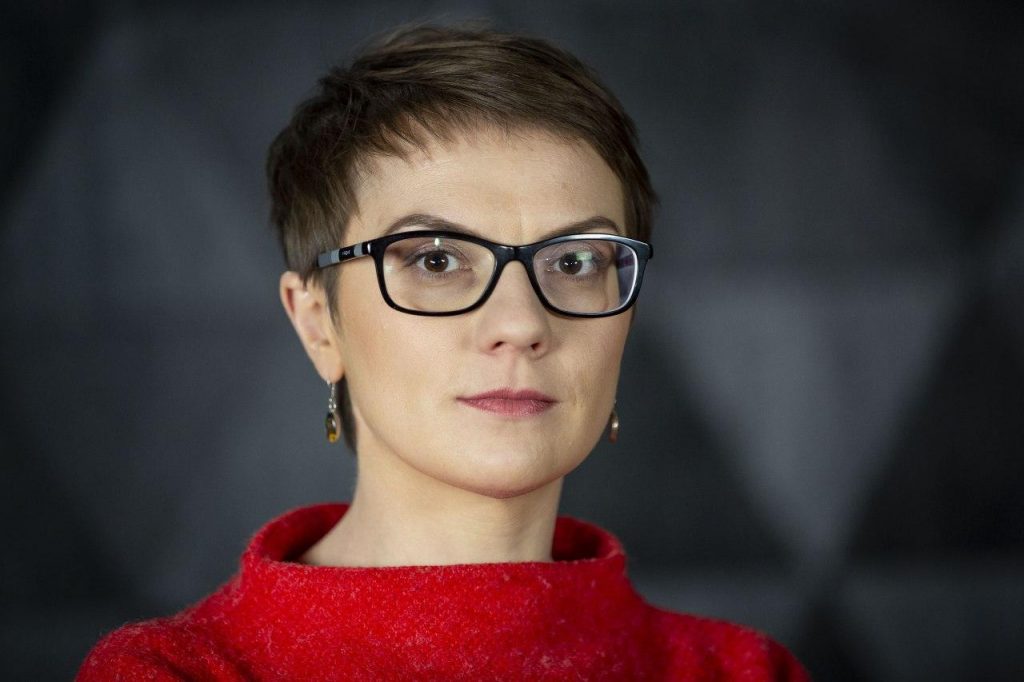A book comprising reportage pieces on the illegally annexed Crimea is out in Ukraine this March. Its author – Nataliya Gumenyuk, a journalist at “Hromadske”, made seven trips to the occupied peninsula between 2014 and 2019. The book is based on her reportage pieces from the occupied peninsula. Nataliya has been observing the annexation, she talked to the families of the political prisoners each time that she was there. She tried to hear the voices of the “silent majority” in the peninsula and find out why drug-dependent persons are dying in hundreds in Crimea. The reporter was also in try to understand the fragile position of the Ukrainian church in Crimea and see if there is hope for restoring Ukrainian sovereignty in Crimea among Crimeans. Ukraine Crisis Media Center sat with Nataliya to talk about her book.
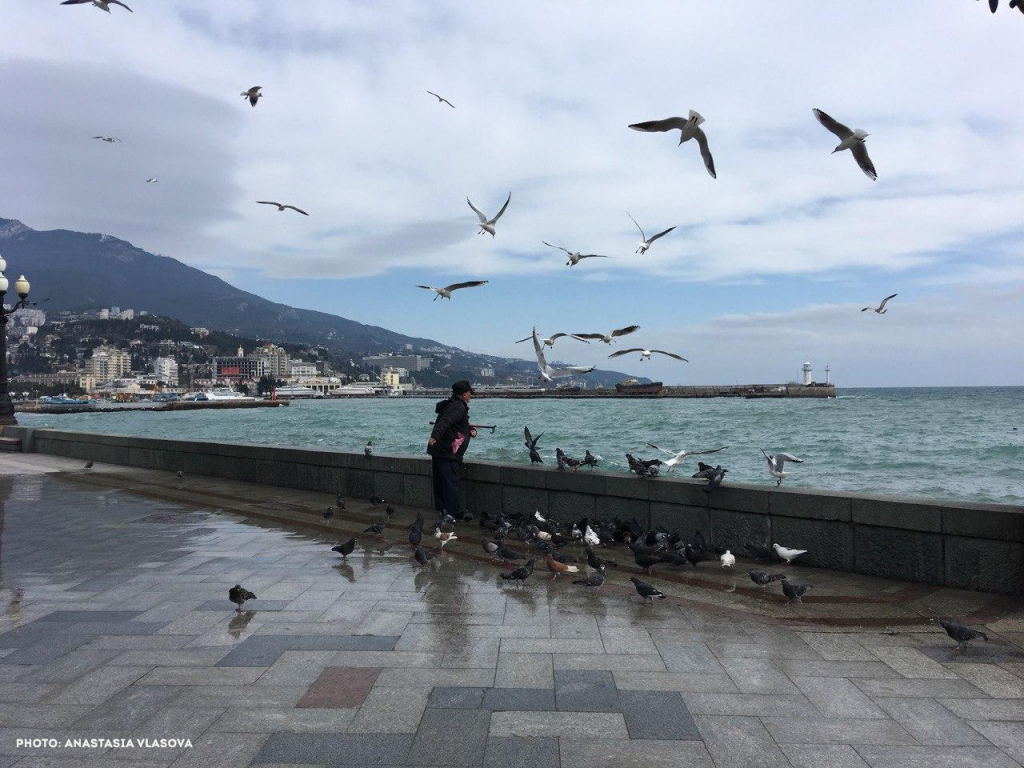
Your book is called “Lost Island”. It’s lost but not gone, and it’s an island, not a peninsula. Why is that?
Let’s start from the island. Throughout all my trips, from the very first day of the annexation in 2014 I had this feeling of Crimea’s absolute separateness, separateness from Ukraine but also from Russia, from the entire world.
In globalized world it is emblematic, while everything is interconnected globally even very far and exotic territories. So here comes Crimea that is formally near but is actually a separate and very far territory. In a world in which it is easy to travel and learn about anything it is somewhat of a paradox.
Besides “vtrachenyi” (in Ukrainian) is something that is gone for ever. It is a huge loss. I purposefully used another word in Ukrainian – “lost” (“zahublenyi”) that stands for something that was lost occasionally, in a swirl. Especially today when we read to recreate the events of March 2014 that everyone seems to remember but has forgotten a bit, it becomes clear that our focus shifted off Crimea back then and it got “lost”, so to say.
There is another, additional meaning to the word “lost”. Crimea is there and is not, there is no discourse on Crimea. Negotiations on Donbas are underway, not on Crimea. Whenever there is an anniversary or a resolution, it comes back. It stays lost in global agenda.
In Ukraine we often discuss things to come. We keep repeating: Crimea is Ukraine. We believe in it, even those who never think about Crimea, who do not like Crimea and do not want Crimea. Crimea is Ukraine. In your book you don’t describe the way it should be but the way it is. This experience of connecting with Crimea, travelling there after the annexation is a unique experience both for Ukraine and for foreigners. International media with a very rare exception also rarely travelled to Crimea after the annexation. Why was it important to you to visit the annexed Crimea every year, to risk and to tell these stories?
Being a foreign correspondent I used to cover foreign conflicts. To be honest, it is my personal inner tragedy. I was studying conflicts in the Middle East but only when the war came to my country I felt what it is like.
I feel twofold responsibility as a foreign correspondent that I now have to work in my country. It is terrible when you always used to think that it happens in some far peripheries, some other places that have historical reasons for it. That’s the first thing.
Secondly, I have always ached to be telling more than what is already exposed. I know from my own experience how twisted the picture portrayed by war journalism is. It is a huge tragedy for the world.
Stories of quiet, structured violence against people behind hot conflicts are being ignored. I wanted to emphasize it with my journalism work through many years. It especially concerns Crimea. In a conversation on Crimea there is so much about geopolitics and so little about human security. Crimea is an emblematic story for the world where it is being neglected, there is a feeling that the West agrees to spheres of influence.
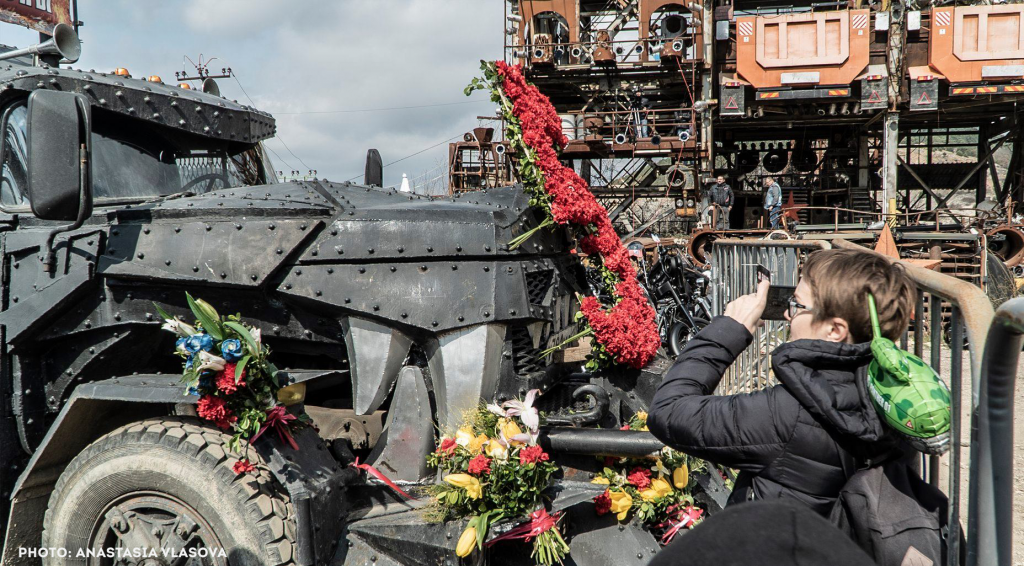
Each chapter of your book is named after an emotion: it starts with fear, anger, disenchantment and hope. Why is that? How did these emotions unfold? Where did we begin and where are we now?
I really liked the comment by Russian journalist Mikhail Fishman on my book. He said that in Russia freedom was being chopped like a cat’s tail, by pieces, while Crimea is a story of a territory losing its freedom at once. I cannot say that we were losing Crimea gradually. Instead our acceptance of it came gradually – normalization of the fact that an entire territory with two million people lost freedom and security in a flash.
In my book there is no history of Crimea before the annexation. I started from the moment when the post-Soviet peninsula in Ukraine, this extremely beautiful recreation area was gradually turning into a normal European resort having a sea, beaches, restaurants and respective industry.
The entire world is like this today. Tourism and travel are the world’s leading industries. We see how easy it is to travel. Crimea started having this potential before the annexation.
After the annexation it all stopped. It is gradually turning into a closed militarized zone, a typical frozen conflict zone that South Ossetia, Abkhazia, Transnistria and Nagorno-Karabakh turned into. While other territories in the world, for example, Northern Cyprus are taking a reverse path, and regions that are not well-off like the Balkan states are gradually rebuilding, in the case of Crimea we see an absolute regress.
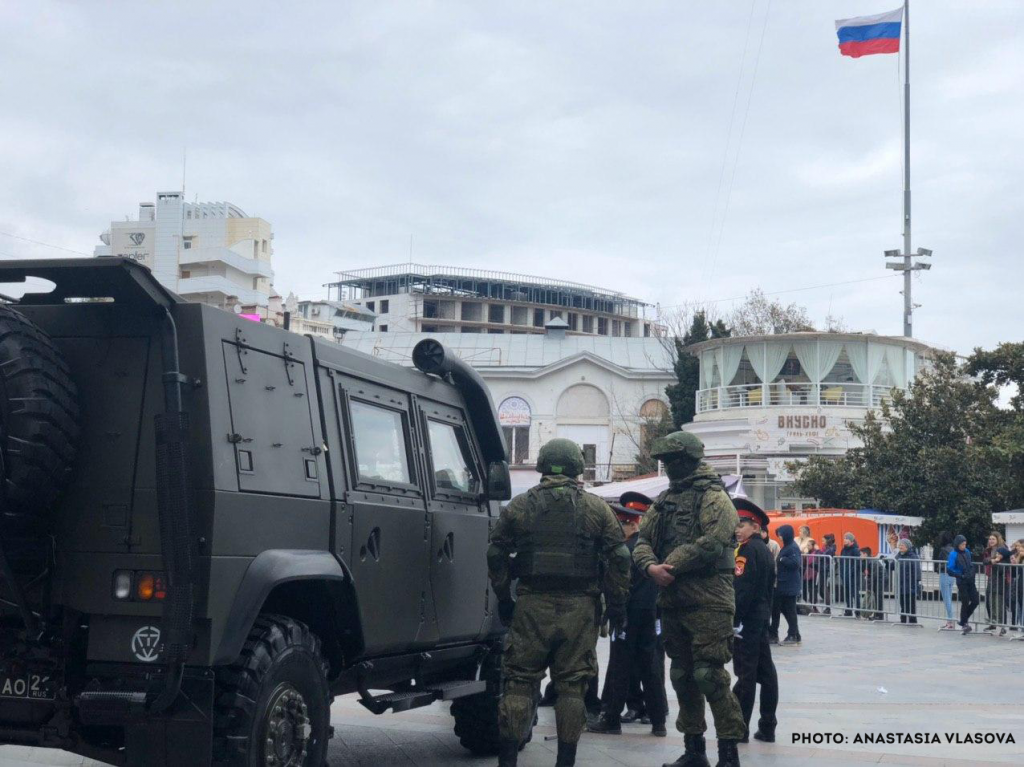
During your trips you talked to a big number of people. Is there hope among Crimeans? Do they expect that one day Ukraine will come, liberate them and will take Crimea back?
I am a reporter. Neither of us can say what everyone thinks. I have a sense that people in Crimea will put up with any authorities to come. They found themselves in the situation of occupation. They are forced to yield to weapons and authority, there are no options. If we imagine an ideal scenario in which Crimea suddenly returns to Ukraine, nothing would happen. Everyone would agree with it.
Many of my friends linked to Crimea bought the book but said that they will not read it in the coming years, because it is too painful for them to read it, mostly because of despair.
What I mean is you don’t understand what you can do. As long as there is the Kremlin, Putin seated in the Kremlin and the regime, it is unclear what to do. Seems like you are absolutely unarmed in this story.
Maybe western countries share a similar sense: it seems like there is nothing they can do, so why waste time. At the same time in some cases there are some very hands-on things one can do within Ukraine or in other countries addressing what should not be tolerated.
As an individual I don’t agree with having no alternatives. If we think about the world and that there is this bad story that we cannot do anything about, it means that we are not capable of anything as humanity and as humans. There are many critical, bad stories in the world. If we address them like that each time, the entire history of development and of evolution will not make sense.
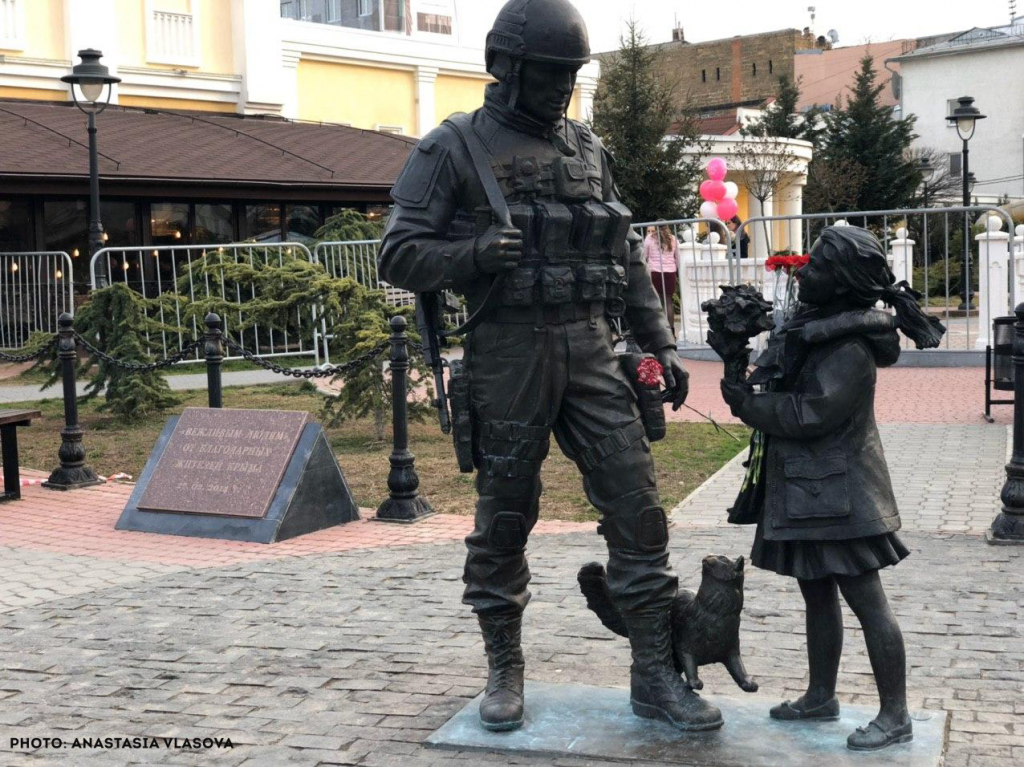
What do we have to know about political prisoners in Crimea? Their stories are many. What would you emphasize today?
First of all the story of imprisonment of Kolchenko and Sentsov should not be underestimated. They were detained in May 2014. They are not Crimean Tatars. The fact that they were taken from Crimea to Russia and sent to Siberia like it used to be in the 19thcentury or under Stalin makes it all very serious.
It is an emblematic story for everyone to understand why there is no resistance in Crimea and people keep quiet. It was demonstrated very early on, in the very beginning, a month and a half after the annexation.
The second story is that of Crimean Tatars. They are a nation deported by Stalin that has its own relation log with Moscow. By the way, unlike Chechens and the rest of the Caucasian peoples, Crimean Tatars were not allowed to come back to their native land until the Soviet Union collapsed.
Very few understand that Crimean Tatars are an example of non-violent resistance. It is a tradition of the Crimean Tatar people and it’s unique. It has the same importance for Crimean Tatar people as, say, Gandhi used to have for India.
Today Russian authorities are using the same template to fight against the Islamic radicalization as in the Russian Caucasus. It demonizes the Muslim population in Crimea by religion.
It is important to remember that Crimean Tatars are an indigenous people not a national minority. Besides, not a single terrorist act has been committed in Crimea. Not a single Crimean Tatar has ever committed a terrorist act. It is demonstrative of how Russia is demonizing the Tatars by religion while justifying it with the fight against jihadism or something similar.
Crimean Tatars are sentenced to 20 years on charges of terrorism or extremism. It is enough to be religious to get the sentence. While many Crimean Tatars are not religious at all.
Religious persecution of Crimean Tatars is demonstrative. It stops a lot of international human rights defenders, because they do not quite understand this situation. Islamic radicalization is a theme that many international experts are afraid to dig into.
Sixty-seven Crimean Tatars are serving their prison terms on charges in the “Hizb ut-Tahrir” case, they are predominantly in jail in Russia, their cases were fabricated.
At the same time there is an organization in Crimea called “Our Children” (“Nashi Dity” in Ukrainian or “Byzym Balalar” in Crimean Tatar) that takes care of 168 children of political prisoners. It exists for three years already. Each child on the list gets 100 euro per month from the Crimean Tatar community. This money is predominantly collected by people in Crimea, by Crimean Tatars.
The fact that this supply system is organized by people and it operates incessantly for three years for each child and each family and is not a one-time aid is phenomenal.
It means a certain process is on there, these are not people who sit and fear. There are lawyers who are constantly travelling to take part in those trials.
There is another story that is little-known, the one about hundreds of people that are actually paying with their lives for the annexation. These are the drug-dependent persons requiring replacement therapy. Tell us, why is it important?
It is a very demonstrative story that is forgotten as well but not occasionally. Before the annexation there were 800 patients receiving methadone replacement therapy in Crimea. It was one of the most successful projects in Ukraine (when drug-dependent persons were treated with replacement therapy – edit.) Replacement therapy in Russia is illegal.
In the first months after the annexation there were calls to address it, but nothing was done. This therapy is really efficient, suspending it means to just let the people die. I was following this case, I talked to people and realized that those people had just one option – to switch back to street drugs.
While I was looking for these people five years later, talking to former patients, I realized that hardly one half of them survived – 400 persons out of 800. I am writing about the people I met in 2014, about the girl who I know for sure has died. I talked to her in May 2014. I was confirmed that she had died, and she is just one of the many.
Russian authorities are watching drug addiction harshly. In Russia they have a punitive policy on drug-dependent persons. They actually got no registry. After the issue was brought up in 2015 by human rights defenders on international level, the issue was closed. It got no response from Russian healthcare officials.
The list of those people is gone, it was classified. The list of those people exists no more. Besides, in Russia drug addiction is criminalized and the prison terms are harsh, so talking to journalists is an absolute risk for those people. It is very dangerous for them and for their families. In Russia many people are serving their prison terms on drug sale charges.
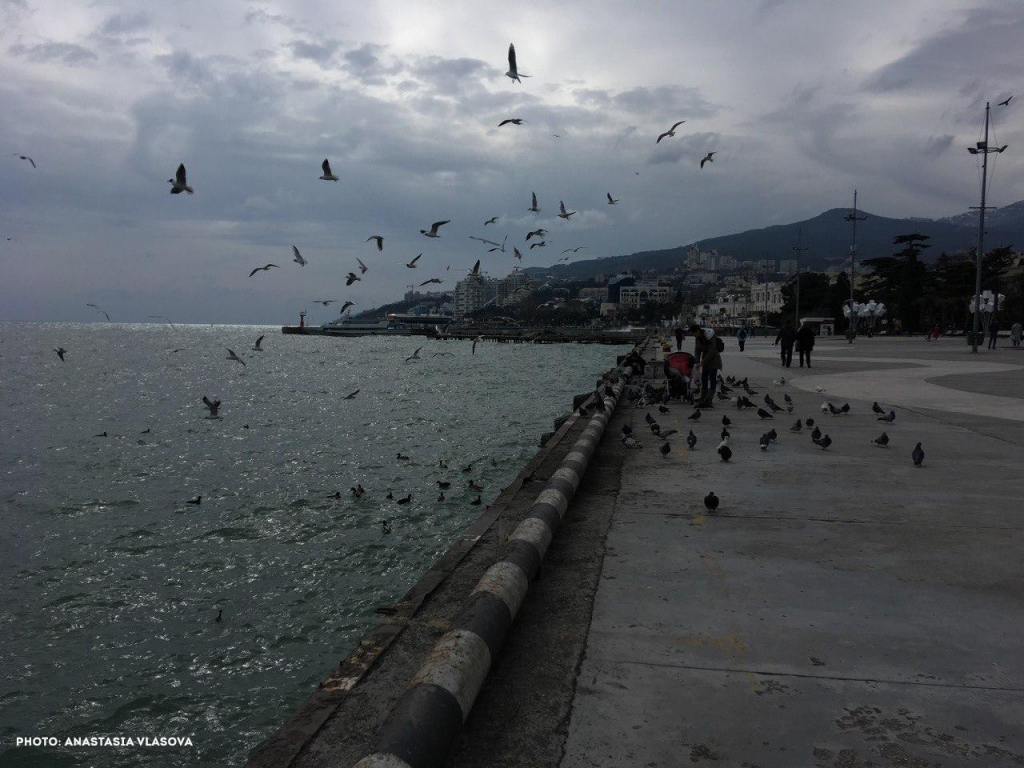
In your book you describe the standards of journalism work in Crimea: how to find a place where to talk, as it is dangerous everywhere, how to switch into Russian in time as it is dangerous to talk in Ukrainian etc. What is the security dimension of journalist’s work in Crimea?
I am often asked by foreigners if Ukrainians are banned from entering Crimea. Formally Ukrainians cannot be banned from entering Crimea, because between Russia that considers Crimea a Russian territory and Ukraine there is no visa regime. There is no ban for Ukrainian citizens to travel to Russia. Crimea is a peninsula that is historically part of Ukraine. It means that the majority of people have families, businesses and other ties with Crimea. It is not a separate territory. Understandably there is a flow of people. In modern world you cannot limit two million people from coming and going.
All this happening despite the absence of legal transportation connection with Ukraine.
There is no railway, there is no legal bus connection but there are actual buses. People pretend they are just visiting relatives. It is such a big flow of people that no one will be ever able to ban it.
Foreign journalists can go to Crimea if they get a permission from Ukraine and if they have a visa to Russia. They have to have a Russian visa while entering through mainland, which makes it inconvenient and far. A foreigner will possibly stand out, it is a rare case. A Ukrainian will look like yet another Ukrainian that are already many. So it is simpler for Ukrainians.
Journalists who are systematically covering Crimea or who work for media like “Radio Liberty” that are seen as foreign by Russia, or who are systematically covering trials, are facing bans. A demonstrative ban was issued to journalist Taras Ibrahimov who was banned from entering Crimea from the Russian Federation for 34 years, until 2054.
Ihaddifferentexperiences. Sometimestheyask, sometimesdon’t. I can explain that I am not from Crimea, I am not an activist, I am not a famous journalist in Crimea, I guess, I don’t work for a project that focuses on Crimea. That’s why it has been probably easier for me so far. No official ban was issued for me.
In my case another aspect is more dangerous – you would not want to come across the Russian officials because they will be asking: “Who have you talked to? What did they say?” You don’t want to put those people at risk. Main task of a professional journalist is not to put their characters in a greater danger, even though formally, by journalism standards you do nothing wrong. But you know that it will affect them, so it is important.
My observation about the Ukrainian language is an interesting one. The pretext for what happened was the alleged oppression of the Russian language that never actually took place. The Ukrainian language is not officially banned but it actually does not exist in the annexed Crimea.
The conclusion I made is that Russia agrees that Crimean Tatar people being not Slavs but Muslims, are a separate people, and they have their language as an ethnic group. For what it takes Ukrainians, especially in Crimea, they disagree that there is such an ethnicity, such a people and such a language. Calling yourself Ukrainian or saying that there is the Ukrainian language and you speak it is immediately taken as a political position. AUkrainianinCrimeamustassimilate.
They are aggressive in their beliefs that this ethnic group must assimilate, recognize that neither Ukraine nor the language exists. So the Ukrainian language is a political statement.
When you travel to Crimea as a journalist, you always hope that you will be let in and out. It is a sign of journalist’s work in any half-legal territory where human rights and freedom of speech are violated.
The final chapter of the book is about hope and expectations that the lost peninsula will be found, will return. What makes you hopeful?
I will be honest, regardless of the subject the final chapter would be called “Hope” anyway. That’s the logic of the genre. Hope is the last thing that stays. (The chapter) is actually about the prisoner swap in September 2019. When you are writing about Sentsov for several years, when you talk to his mother, travel to meet those people – the mother of Balukh, Sentsov and Kolchenko, it is one and the same story every time. They were not let free again and you don’t know what else to ask. And then they are finally freed.
At the same time I elaborate that they were liberated but they did not come back home.
I happened to live through another weird episode. It was not written from Crimea but from Moscow. When there was a prisoner swap in September 2019 I was covering it from the Russian side, when they were let free from prison. A weird story happened to me there. When I was waiting by the prison in Lefortovo I met two Russian journalists from “Rossiya-1” and “Russia Today” TV channels.
Turned out they were both Ukrainian from Sevastopol. One of them wanted to talk to me in Ukrainian. Half-jokingly he kept switching to Ukrainian, and they were both saying they missed Kyiv.
One of them has his mother living here, in Kyiv, he has more relatives here. They want to be coming back to Crimea but they work on Russian channels. I describe the circumstances of this encounter in my book. It was at night, at 3 a.m., in jail. These are not the circumstances to exchange political beliefs.
The situation was weird but I was not surprised. Those people did not say they were Russians, they did not insist they were Ukrainians, they were not aggressive.
They did not emphasize that they took the other side. It is evident, if they are in Moscow, if they work for Russian state TV channels, they are probably the same people that supported the annexation. But they said nothing about them directly supporting it. They explain it with their life circumstances.
It actually means that you can communicate with those people in some way, they have not reached the point of no return. It does not mean that I am in some way justifying that they sided with Russia. It just creates a feeling that it is not the point of no return, that the point of no return between people does not actually exist.
The electronic version of the book (in Russian) you can find here.


